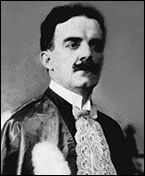 Afrânio Peixoto
Afrânio Peixoto
(1876 – 1947)
Afrânio Peixoto was born on 17 December 1876 in Lençois, Bahia. He was a physician, professor of
Legal Medicine, writer, poet, founder of the Brazilian Academy of Philology and member of Academia Brasileira de Letras. He started writing in 1900 and published more than 30 works, among them, drama, romance, biographies, and more - Rosa Mística (1900), Trovas brasileiras (1919), História da Literatura brasileira (1930), Miçangas (1931) etc.
It was Peixoto who made haiku known to readers when he published in 1919 his book Popular Brazilian Trovas (Trovas Populares Brasileiras). This book contains a collection of 1000 Brazilian quatrain poems and a few haiku. Up to 1919 haiku was not as well known in Brazil, even though a few had been published.
The trova was the closest Brazilian poetic form to haiku until then. It consists of four verses with seven metric syllables each and at least a pair of ending rhymes in the second and fourth verses. As Peixoto states in the Preface of his book, trova “is our most basic art form,” since it contains “a fugitive state of the soul, a long hug of the heart, desire, complaints, satisfaction, malice, judgment . . . reported to others with sincerity and simplicity.” It is also in the preface that the term haikai is mentioned. According to the author, the Japanese also have their elemental form of art: the haikai. For him, haiku is a lyric epigram, i.e., a small poetic form, poignant or critical.
Between 1904 and 1906, Peixoto was in several European countries in order to acquire new knowledge. By this time Paul-Louis Couchoud (1879 – 1959), a young medical student and writer, and two friends were publishing Along the Path of Waters (Au fil de l’eau) (1905), containing 72 Japanese poems. In 1904, Couchoud went to Japan to spend a year studyingJapanese language and culture, and a year later, he published his poems. Peixoto mentions Couchoud in a footnote in the preface of his book of trovas, referencing Couchoud’s book Asian Sages and Poets (Sages et Poets d’Asie), which republished the author’s haiku. The mention of haiku in Peixoto’s book is brief, and offers four examples of haiku for comparison with trova, from where the haiku below was extracted:
Esta corola de lírio
Quer continuamente
Me voltar as costas
This lily’s corolla
wants continuously
to turn its back to me
In 1931, Peixoto again published haiku in his book Beads (Missangas). This book contains an essay on haiku, “The Japanese haiku or Lyric Epigram” (“O Haikai Japonês ou Epígrama Lírico”) followed by 52 haiku, almost all of them with a rigid metric of 5-7-5 syllables and a title in capital letters:
SÓ OS OUSADOS SÃO FELIZES
Sem pedir, o vento
Derruba as flores do chão . . .
Eu nunca ousei.
ONLY THE BRAVE ARE HAPPY
Without asking, the wind
Sheds the flowers on the ground . . .
I never dared.
On 5 October 1934 Afrânio Peixoto was awarded the Grand Cross of the Military Order of St. James of the Sword of Portugal. He was also Rector of the University of the Federal District in 1935 and after 40 years of outstanding service, he retired. Afrânio Peixoto died in Rio de Janeiro on 12 January 1947 at the age of 70 years.
Books published:
- Rosa mística - drama (1900)
- Lufada sinistra - novela (1900)
- A esfinge - romance (1911)
- Maria Bonita - romance (1914)
- Minha terra e minha gente - história (1915)
- Poeira da estrada - crítica (1918)
- Trovas brasileiras
- Parábolas
- José Bonifácio, o velho e o moço - biografia (1920)
- Fruta do mato - romance (1920)
- Castro Alves, o poeta e o poema
- Bugrinha - romance (1922)
- Ensinar e ensinar
- Dicionário dos Lusíadas - filologia (1924)
- Dinamene
- Arte poética - ensaio (1925)
- As razões do coração - romance (1925)
- Camões e o Brasil - crítica (1926)
- Uma mulher como as outras - romance (1928)
- Sinhazinha (1929)
- Miçangas
- Viagem Sentimental
- História da literatura brasileira
- Castro Alves - ensaio bibliográfico (1931)
- Panorama da literatura brasileira
- Pepitas - ensaio (1942)
- Amor sagrado e amor profano
- Despedida
- Obras completas
- Indes
- É
- Breviário da Bahia
- Livro de horas
Selected work:
Na poça da lama,
Como no divino céu
Também passa a lua
In mud puddle
as the divine sky,
Also passes the moon.
*
A BELEZA ETERNA
O sabiá canta,
Sempre uma mesma canção:
O belo não cansa.
EVERLASTING BEAUTY
The mockingbird sings,
Always the same song:
The beautiful does not tire.
*
COMPARAÇÃO
Um aeroplano
Em busca de combustível . . .
Oh! é um mosquito.
COMPARISON
An airplane
In search of fuel . . .
Oh! it’s a mosquito.
*
CRÍTICA À CRIAÇÃO
O boi come a grama
E nós o boi. Deus não teve
Imaginação.
CRITIQUE OF CREATION
The ox eats the grass
And we eat the ox. God had no
Imagination.
(Trovas Populares Brasileiras, Rio de Janeiro [etc.] F. Alves, 1919)
This profile was created in collaboration with the Brazilian poet Rosa Clement. We are very grateful for her help and support!
Sources:
- https://pt.wikipedia.org/wiki/Afr%C3%A2nio_Peixoto
- http://www.thehaikufoundation.org/omeka/files/original/3a31681d7407cccf82631a2b0657c89d.pdf
- http://www.thehaikufoundation.org/omeka/files/original/a718b8abfbbdb0e31fcd4ece5f372b54.pdf
- https://catalog.hathitrust.org/Record/001057369
- http://www.sumauma.net/artigos/artigo-rosa1.html
- http://www.antoniomiranda.com.br/poesia_brasis/bahia/afranio_peixoto.html
- http://www.kakinet.com/caqui/brasil2.htm
“Zen in Brazil: The Quest for Cosmopolitan Modernity” by Christina Rocha, University of Hawaii Press, 2006.
